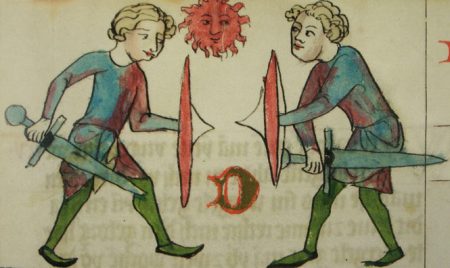
In 1456, a Hampshire man named Thomas Whytehorne was found hiding in the New Forest, arrested and convicted of several charges of theft. To spare himself from execution, Whytehorne agreed to provide the authorities with names of his accomplices, as well as other local criminals. He also offered to stand combat against anyone who disputed his accusations.
Whytehorne was a large and powerful man so there were no takers – until he informed against a local boatman named James Fyscher. A devoutly religious man, Fyscher did not take kindly to being falsely accused of a crime, so invoked his right to trial by combat.
The local lord agreed to Fyscher’s request and handed down a set of regulations for his combat with Whytehorne:
“[Both] must be clothed all in white sheep’s leather… They should have in their hands two staves of green ash, of three foot in length… and on the other end a horn of iron, made in the shape of a ram’s horn, the small end as sharp as might be made… If their main weapon is broken they must fight with their hands, fists, nails, teeth, feet and legs… They should make their foul battle upon the most sorry and wretched land that can be found about the town… They both must be fasting… and if they need any drink, they must take their own piss.”
The trial by combat took place in Winchester. Public opinion was firmly against Whytehorne, a career criminal with a reputation for dishonesty. Regardless, Whytehorne’s strength won him an early advantage after he managed to break Fyscher’s weapon. The magistrate stopped the trial and disarmed both men, leaving them to fight ‘tooth and nail’.
“They did fight with both their teeth, such as the leather of their clothing and their flesh was torn on many parts of their bodies. And then the false accuser [Whytehorne] cast the innocent [Fyscher] down upon the ground, and did bite his private member, causing the innocent to cry out. And then with a new strength, the innocent recovered to his knees that took the false accuser’s nose with his teeth and put a thumb into his eye, that the appellant cried out and prayed for mercy, admitting that he had accused falsely against him [Fyscher] and 18 other men.”
According to a contemporary chronicler, Whytehorne was immediately hanged for making false accusations. Fyscher was cleared and released, though he was by now severely wounded. The only thing said of Fyscher’s fate was that he “went home, become a hermit and within a short time died”.
Source: Gregory’s Chronicle, 1451-60. Cited in James Gairdner (ed.), A Citizen of London in the 15th Century, 1876. Content on this page is © Alpha History 2019-23. Content may not be republished without our express permission. For more information please refer to our Terms of Use or contact Alpha History.
